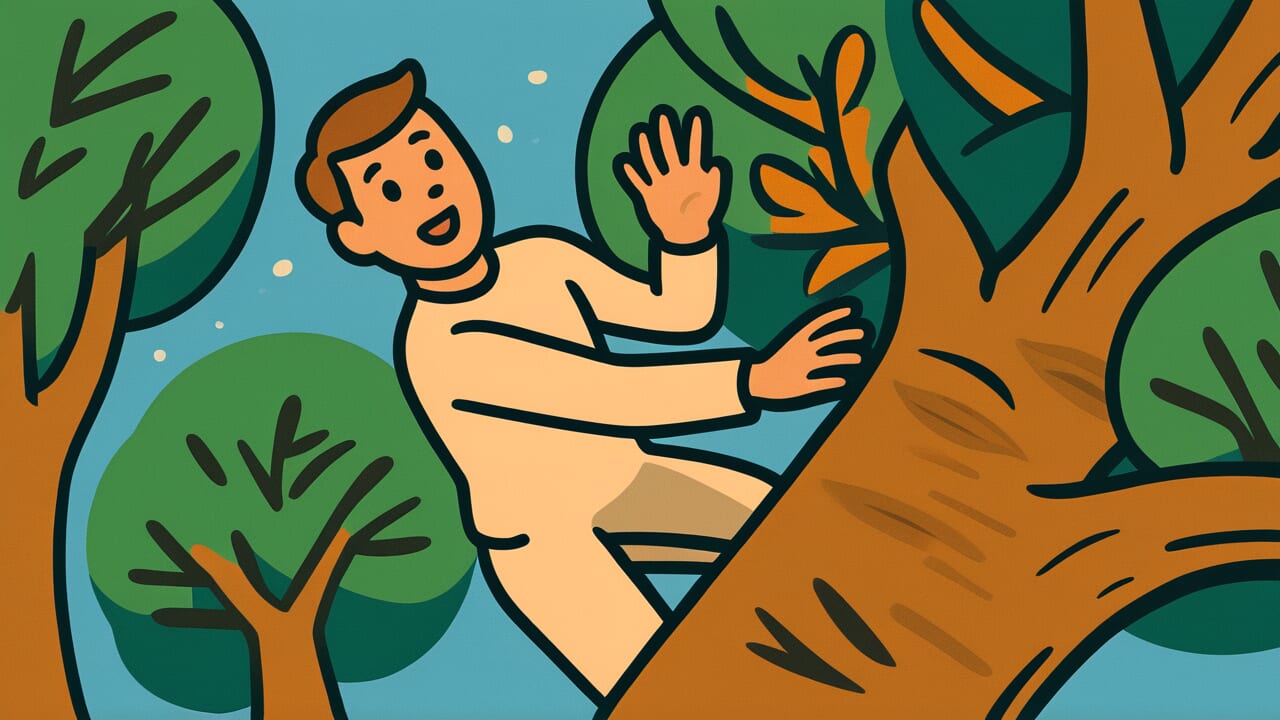How to Read “Tree climbers meet their end in trees”
Kinobori wa ki de hateru
Meaning of “Tree climbers meet their end in trees”
“Tree climbers meet their end in trees” means that what you’re good at can actually cause you to fail or bring disaster.
The proverb captures the irony of an expert tree climber losing their life while doing what they do best.
This proverb is used when skilled people fail because they become careless or overconfident.
When you’re good at something, you stop paying attention. When you’re used to something, you forget the basics.
The saying warns us about this human weakness.
Even today, we see many situations where this proverb applies. Veteran drivers get into accidents. Experienced workers suffer workplace injuries. Experts make judgment errors.
People lose their caution in their areas of expertise. This leads to major failures.
The proverb captures this situation perfectly and remains relevant today.
Origin and Etymology
There are no clear records of when this proverb first appeared in literature.
However, the structure of the phrase reveals an interesting background.
Tree climbing has been closely connected to Japanese life since ancient times.
People climbed trees to harvest fruit, cut timber, and keep watch. It was an everyday skill.
Naturally, the better you were at climbing trees, the more often you climbed them.
The word “hateru” in classical Japanese means “to end” or “to die.”
So this proverb expresses the irony of expert tree climbers losing their lives while doing what they’re best at.
Why did people create this expression? They noticed a truth through long experience.
The things you’re good at make you careless. Familiar tasks make your attention wander.
Expert tree climbers had accidents while doing what they knew best.
People who witnessed such events saw a life lesson in them. They passed it down as a proverb.
This expression captures the relationship between skill and overconfidence remarkably well.
Usage Examples
- He was a veteran salesman, but he got careless with his best client and lost a major contract. Tree climbers meet their end in trees, indeed.
- Just because you’re good at programming doesn’t mean you should skip basic backups. Otherwise, tree climbers meet their end in trees.
Universal Wisdom
“Tree climbers meet their end in trees” brilliantly captures the ironic mechanism of human growth and decline.
Why do people fail at what they’re good at? Because mastery and overconfidence are two sides of the same coin.
Developing skills and gaining experience are wonderful things.
But during this process, people unknowingly fall into a dangerous mental state.
They think “This much is fine” or “I do this all the time.” This is carelessness.
The tension and humility they had as beginners gradually disappear.
What’s even more serious is this fact: the better you are at something, the more you do it.
Expert tree climbers climb trees more than anyone else. This means they expose themselves to risk more often.
Statistically speaking, their chances of having an accident increase.
Our ancestors condensed this universal truth into the simple phrase “Tree climbers meet their end in trees.”
It’s not just a warning. It shows a fundamental contradiction in human existence.
It reveals the price of growth and the danger of mastery.
No matter how skilled you are, you’re not perfect as long as you’re human.
When you forget this humility, you perish through your own expertise.
This teaching continues to challenge us across time.
When AI Hears This
The irony of expert tree climbers falling to their deaths is exactly what complexity science calls the “competency trap.”
This refers to how the more you develop a skill, the more you depend on it and stop exploring other options.
What’s interesting is that this trap has a mathematical structure.
Research on organizational learning shows that each success exponentially increases the probability of choosing the same method again.
For example, after ten successful tree climbs, the probability of choosing tree climbing next time exceeds 90 percent.
The more you succeed, the more rapidly your chances of trying other possibilities decrease.
What’s even more serious is that skill improvement and tunnel vision happen simultaneously.
As tree climbing skills improve, you only gather information about trees. You become less aware of ground dangers or weather changes.
This is called information filter bias. Experiments confirm that experts tend to dismiss warnings outside their specialty.
Kodak’s insistence on film technology made them miss the digital wave. Dinosaurs specialized too much in size and went extinct when the environment changed.
These follow the same structure. What you’re good at blocks your own escape routes.
Lessons for Today
This proverb teaches you the importance of staying humble, especially about what you’re good at.
Whether in work or hobbies, having something you’re good at is wonderful.
But remember that this is also where the biggest pitfall lies.
Specifically, make it a habit to return to basics regularly in your areas of expertise.
Even as a veteran, recall the tension you felt as a beginner. Use checklists even for familiar tasks.
Don’t trust your judgment too much. Sometimes ask for others’ opinions.
These small practices prevent major failures.
Also, when you’re succeeding repeatedly in your specialty, take time to pause and reflect.
Ask yourself: “Have I been careless lately?” “Have I forgotten the basics?”
This self-questioning protects you.
What you’re good at is your strength. It enriches your life.
That’s exactly why you should never forget humility and caution if you want to keep using that strength.
This is the timeless wisdom this proverb conveys.



Comments